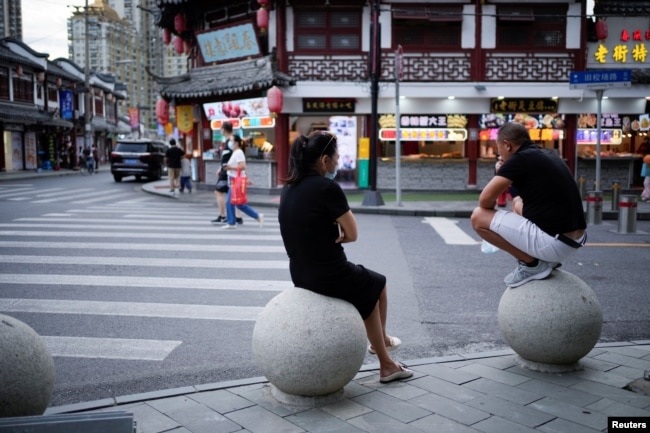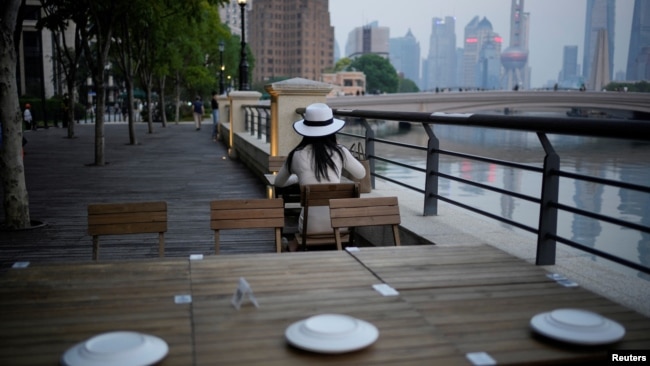不透明な時代、個人消費の落ち込みは世界中皆同じです。しかし、中国だけは違うかと思っていました。
個人マインドはGDPに影響を与えます。中国の現状を聴いてみましょう。
VOAで英語を学びましょう!!
※今回のキーポイント:more likely to do/take off/even if
中国の若者は経済の落ち込みで支出を減らしている(和訳)
Young Chinese Cutting Spending as Economy Falling
September 21,2022
COVID-19が流行する前、ドリス・フーさんは自分自身と家族の違う未来を想像していました。新しい車と大きなマンションを買い、週末には素敵なレストランで食事をし、南国の島々へ旅行して。
しかし、現在、上海のマーケティング担当者39歳の女性は、できる限りお金を節約しています。
フーさんをはじめ、20代、30代の多くの中国人は、中国のパンデミックロックダウン、若者の高い失業率、不動産市場の弱体化などを心配しています。その結果、中国の若者は支出よりも貯蓄に重点を置くようになりました。
この質素(frugal)な生活様式は、ソーシャルメディアによってより一般的になりました。ソーシャルメディア上では、インフルエンサーが節約術を披露しています。
しかし、このような低コストの生活の台頭は、世界第2位の経済大国に害を及ぼす可能性があります。個人消費が中国の国内総生産、GDP、の半分以上を占めています。
ベンジャミン・キャベンダー氏はChina Market Research Groupのディレクターです。彼は、「我々は16年間ここで消費者行動をマッピングしてきましたが、そのすべての中で、若い消費者を最も懸念しています。」と述べています。
政府のデータによると、16歳から24歳の失業率は19%近くに達しています。給与カットを余儀なくされている若者もいます。中国の主要38都市の平均給与は、今年1〜3月で1%減少しました。この情報は、オンライン就職情報会社Zhilian Zhaopinによるものです。
その結果、お金を使うより貯めることを好む若者もいます。
例えば、フーさんは大の映画好きです。以前は月に2回は映画館に映画を見に行っていたとい言います。しかし、フーさんは「パンデミック以来、映画館に足を踏み入れていません。」と言います。
中国人民銀行(PBOC)の最新の調査によると、中国では現在、ほぼ60%の人が消費や投資を増やすよりも、貯蓄を増やす可能性があると回答しています。この数字は3年前には45%でした。
このことは、経済成長を高めるために個人消費に長年頼ってきた中国の経済政策立案者にとって問題です。
PBOCのある幹部は7月、パンデミックが緩和されれば、投資と消費への意欲は "安定し、上昇する "と言っています。
中国人民銀行はロイター通信の記者のコメント要請に答えていませんし、中国商務部もコメントの要請に答えていません。
’10元ディナー’
※Yuan:【júːən】
賃金の上昇、オンラインショッピング、簡単なクレジット決済に煽られ、何年も支出が増加してきた後、若者は消費行動を変えつつあります。この変化は、経済的に大変だったという記憶から、お金を貯める傾向がある不況の記憶から節約志向の強い親世代に近づいています。
しかし、親世代とは異なり、中国の若者はネット上で質素な生活ぶりをアピールしています。
東部の都市、杭州に住む20代のある女性は、10元、約1.45ドル、で夕食を作る方法を100本以上公開し、数十万人のフォロワーを獲得しています。この女性はソーシャルメディア上ではLajiangという名前で活動しています。
ソーシャルメディア上では、人々が節約術を議論し、コンテストまで作っています。中国で最も物価の高い都市の1つである上海では、”1カ月1600元で暮らすチャレンジ”が若者の間で人気です。
ヤン・ジュンさんは、パンデミック前、カードローンで借金まみれでした。2019年、彼女はネットワークサイト豆瓣Douban(トウバン)で低消費研究会というグループを立ち上げました。同グループは15万人以上の会員を獲得しています。ヤンさんは支出を減らし、持ち物の一部を中古品サイトで売ってお金を稼ぎ、毎日飲んでいたスターバックスコーヒーもやめたと言います。
※豆瓣(Douban)は中国の大手ソーシャル・カルチャー・サイト。ユーザー数は1億6000万人以上で、広く人気を集めるSNSプラットフォーム。2005年にDouban.comとして開設され、当初は「同じ趣味を持つ友達が探せる掲示板」だったが、現在は書籍・音楽・映画のレビュー投稿、ユーザーの登録したデータに基づくレコメンド機能、ユーザー同士の交流が可能になるSNS機能など様々なサービスを使用できるユーザー参加型コミュニティサイトとなってる。ユーザーはアートやカルチャー、ライフスタイルに対して関心が高い層、大都市に住む会社員やアーティスト、フリーランサー、学生がほとんど。
ー中国マーケッティング情報サイトhttps://china-marketing.jp/より抜粋
マーケティングのプロであるフさんは、化粧品をジバンシーからフローラシスという中国のブランドに変え、60%ほどコストを下げたと言います。
中国でこのような商品を手放しているのは、ヤンさんとフーさんだけではありません。スターバックスとジバンシィを所有するフランスのディーラーは共に、直近の四半期に中国での売上が急激に減少したと報告しています。
フさんは、2つの小さなアパートを売って、息子のためにより良い学校システムの近くにある大きなアパートに引っ越す計画を延期したと言います。また、より新しい、より良い車を買うという目標もあきらめたと彼女は言っています。
「お金があっても、家と車をアップグレードしないのはなぜか?」「すべてが未知数なんです。」とフーさんは言いいます。
Young Chinese Cutting Spending as Economy Falling
Before the COVID-19 pandemic, Doris Fu imagined a different future for herself and her family. She imagined buying a new car and a bigger apartment, eating at nice restaurants on weekends and traveling to tropical islands.
But today, the 39-year-old Shanghai marketing professional is saving her money as much as she can.
Fu and many other Chinese in their 20s and 30s are worried about China’s pandemic lockdowns, the high unemployment rates among young people and a weakening property market. As a result, young Chinese citizens are focused on saving instead of spending.
This frugal way of life has been made more popular by social media. Influencers across social media are sharing their money-saving tips and tricks.
This rise of low-cost living, however, may harm the world’s second-largest economy. Consumer spending makes up more than half of China’s gross domestic product, or GDP.
Benjamin Cavender is a director of China Market Research Group. He said, “We’ve been mapping consumer behavior here for 16 years and in all of that time this is the most concerned that I’ve seen young consumers.”
Unemployment among people aged 16 to 24 stands at almost 19 percent, says government data. Some young people have been forced to take pay cuts. The average salary in 38 major Chinese cities fell 1 percent in the first three months of this year. That information comes from the online job search company Zhilian Zhaopin.
As a result, some young people prefer to save money instead of spending it.
Fu, for example, is a huge movie fan. She said she used to go to the movie theater to see a film two times a month. But, Fu said, "I haven’t stepped inside a cinema since the pandemic.”
Almost 60 percent of people in China are now likely to save more, rather than spend or invest more, according to the most recent study by the People's Bank of China (PBOC). That number was 45 percent three years ago.
That is a problem for China's economic policymakers, who have long depended on consumer spending to increase economic growth.
A PBOC official said in July that when the pandemic eases, the willingness to invest and consume will "stabilize and rise."
The PBOC did not answer Reuters reporters’ requests for comment. China's Ministry of Commerce also did not answer requests for comment.
’10 Yuan dinner'
After years of rising spending fueled by rising wages, online shopping and easy credit, young people are changing their spending behaviors. The changes bring them closer to the ways of their parents’ generation, whose memories of hard economic times have made them more likely to save money.
But unlike their parents, young Chinese are making a show of their frugal way of life online.
One woman in her 20s in the eastern city of Hangzhou has gained hundreds of thousands of followers by publishing more than 100 videos on how to make dinner for 10 yuan, about $1.45. The woman goes by the name Lajiang on social media.
People on social media are discussing money-saving tips and even creating competitions. The 'Live off 1,600 yuan a month challenge' took off among young people in Shanghai, one of China's costliest cities.
Yang Jun says she was deep in credit card debt before the pandemic. In 2019, she started a group called the Low Consumption Research Institute on the networking site Douban. The group has gained more than 150,000 members. Yang says she is cutting spending and is selling some of her belongings on second-hand websites to make money. Yang also said she has cut out her daily Starbucks coffee.
Fu, the marketing professional, said she changed her makeup brand from Givenchy to a Chinese brand called Florasis, which is about 60 percent less costly.
Yang and Fu are not the only ones in China giving up such goods. Both Starbucks and the French dealer that owns Givenchy have reported sharp drops in sales in China in the most recent quarter.
Fu says she has delayed plans to sell her two small apartments for a bigger one that is near a a better school system for her son. She also has given up on her goal of buying a newer, nicer car.
"Why do I dare not upgrade my house and my car, even if I have the money?" Fu said. "Everything is unknown."
Words in This Story
tropical - adj. of, relating to, occurring in, or used in the tropics
focused - adj. giving attention and effort to a specific task or goal
frugal - adj. careful about spending money or using things when you do not need to
consumer - n. a person who buys goods and services
tips - n. useful information
GDP - n. the total value of the goods and services produced by the people of a nation during a year not including the value of income earned in foreign countries
cinema - n. a movie theater
stabilize - v. to stop quickly changing, increasing, getting worse, etc.
upgrade - v. to choose to have or use something more modern, useful, etc.

